The security plan for the elections is centered around creating favorable conditions for voter participation, which includes suppressing any suspicious activities or violations, and non-interference in the electoral process. Additionally, collaboration between the media and security bodies was emphasized by the Minister of Interior during a recent meeting, and later reinforced by Army Commander Joseph Aoun in another meeting with military leadership and unit leaders last Tuesday.
An agreement was reached to increase coordination with political and civil party movements involved in the electoral process, with a formal request for collaboration from these parties with the existing security and military forces if needed. Approximately 110,000 military and security personnel will participate in the plan, comprising 70,000 to 80,000 soldiers from the army, 17,000 to 20,000 from the Internal Security Forces, with the remaining personnel divided between the General Directorate of General Security and the General Directorate of State Security.
All sectors are expected to reach 100% readiness, including army units, starting from the early hours of today until the expected announcement of results next Monday. Tasks have been assigned to all security agencies. As per the law, the Internal Security Forces are responsible for the security of polling stations within electoral facilities, with the army only intervening upon a formal request for assistance from the security forces at the polling station, to be documented in writing.
Outside the polling stations, the army is tasked with maintaining security, as reported by “Al-Akhbar.” A 50-meter radius around the polling station will be designated as a restricted area for electoral campaigning, monitored by army units. Beyond this area, the army will ensure security through military deployments, which will include patrols and fixed and mobile checkpoints, especially on main roads used by voters.
For instance, information circulated in Beirut regarding intentions by supporters of the Future Movement to close some roads on election morning. Military unit leaders have been given strict instructions to safeguard pathways and prevent attacks on voters while intervening in case of any emergencies, as the directive is to prevent disturbances tomorrow.
The Military Intelligence Directorate has been tasked, in coordination with the Information Branch and the Investigation Division of the Internal Security Forces and State Security, to undertake preemptive security tasks on the ground by deploying operational civilian units in various regions, particularly those expected to experience heightened tensions.
In this context, all army divisions and units are on full alert and will commence a comprehensive deployment across Lebanon to secure international highways, public roads, polling and counting centers, ensuring presence in every city, town, and village, from the larger to the smaller electoral districts, reaching the vicinity of polling stations. The Internal Security Forces will be present inside the stations, bolstered by additional units withdrawn from prisons, while the General Security will fill in gaps, and the Directorate of State Security will operationally monitor the electoral process to combat and prevent any attempts to influence voters through money, coercion, or intimidation, ensuring a continuous supply of electricity to polling and counting centers.
General Joseph Aoun's directives are clear, as reported by "Nidaa al-Watan": No intervention, bias, or failure to fulfill duties in safeguarding the security of the electoral process will be tolerated. Any officer or soldier failing in this national duty will face dismissal. The army is ready and determined.
Moreover, in addition to ensuring election security, the army will also provide fuel and logistical support, with a network of command rooms extending from the district to the province, funneling all information to a central operations room for prompt decision-making in case of any incidents.
Proactive measures have not ceased either; many issues have been silently addressed, especially after information surfaced regarding efforts by identified parties to exploit the anger of families of victims from a recent tragic incident by offering them money to incite protests and armed confrontations on election day, including a planned vigil by the sea tomorrow followed by potential disturbances at polling stations in the area of Al-Qobbeh.




